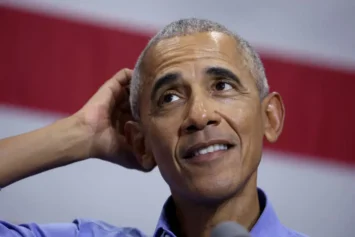An impossibly intense week of threats, speeches, negotiations and planning culminated today in an announcement by Secretary of State John Kerry that the U.S. and Russia have reached an agreement calling for Syria’s arsenal of chemical weapons to be removed or destroyed by the middle of 2014.
The agreement, which officials called a “framework,” requires Syria to allow international inspectors into the country by November and to provide a “comprehensive listing” of its chemical stockpile in the next week.
Kerry made the announcement at a news conference in Geneva with Russian Foreign Minister Sergey V. Lavrov.
“The real final responsibility here is Syrian,” a senior administration official said of the deal.
Perhaps the most difficult part for the weapons inspectors in Syria will be inspecting, removing and destroying a large arsenal of chemical weapons in the midst of a deadly civil war, which has killed more than 100,000 people, according to U.N. estimates.
Lavrov said the agreement would require the cooperation of Syrian rebels, not just the government of President Bashar al-Assad.
The Syrian opposition is not pleased that President Obama set aside the threat of military action, at least for now, and to negotiate with Russia, a major arms supplier to the Assad government.
“This is very, very difficult, very, very difficult,” an American official said of the agreement. “But it is doable.”
“If fully implemented, this framework can provide greater protection and security to the world,” Kerry said in Geneva.
The United Nations Security Council would step in if Assad didn’t comply with the agreement. Kerry said Chapter 7 of the United Nations Charter authorizes punitive action, but Lavrov pointed out that Russia, which wields a veto in the Security Council, had not withdrawn its objections to the use of force.
But with the joint announcement, the intense discussions over America’s involvement in Syria, which have preoccupied the public and national media over the past week, took a head-spinning turn.
Though many commentators have called Obama’s handling of the entire matter bumbling and will want to assign the latest developments to luck, the White House can take an immense sigh of relief that Russia’s involvement has allowed the U.S. to shelve talks of a military strike and probably save many lives.
As arms control officials for both countries worked into the night, observers with some years in the international arena likened it to treaty negotiations between the U.S. and the former Soviet Union during the Cold War.
Called “Framework For Elimination of Syrian Chemical Weapons,” the agreement is just four pages long and outlines procedures for “expeditious destruction of the Syrian chemical weapons program and stringent verification.”
Russia and the U.S. have agreed that the Syrian government possesses 1,000 tons of chemical agents and precursors. The U.S. believes the material is located in 45 sites, all in regime hands, half of which have useable quantities of chemical agents, according to a U.S. official. But it is believed that Russia has not agreed on the number of sites, nor that they are all under control.
These are the six points to the agreement:
- The amount and type of chemical weapons must be agreed and “rapidly” placed under international control.
- Syria must submit a comprehensive listing of its stockpiles within one week.
- Extraordinary procedures under the Chemical Weapons Convention will allow “expeditious destruction.”
- Syria must give inspectors “immediate, unfettered access” to all sites.
- All chemical weapons must be destroyed, including the possibility of removing weapons from Syrian territory.
- The U.N. will provide logistical support, and compliance would be enforced under Chapter VII.
French Foreign Minister Laurent Fabius said it was an “important advance.” France was the only country that agreed to join the U.S. in taking military action in Syria.
U.N. Secretary-General Ban Ki-moon pledged “the support of the United Nations in its implementation.”
But the Syrian opposition was not so pleased, with leader of the anti-Assad Free Syrian Army rejecting the deal and promising to continue fighting.
“There is nothing in this agreement that concerns us,” said Gen. Salim Idriss, who called it a Russian initiative designed to gain time for the Syrian government.


